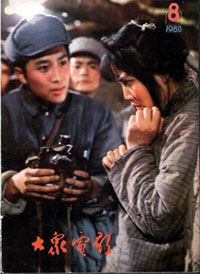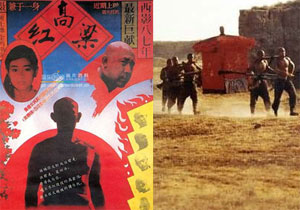|

|
|
August issue of Popular Cinema in 1980
|
China's opening to the world 30 years ago rejuvenated its movie business and provided it with a welcome opportunity to develop. Now this aspect of the country's cultural scene has made real progress, and Chinese movies are playing an increasingly important role in world cinema. Movie stars such as Zhang Ziyi, Jet Li and Jackie Chan have become household names both at home and abroad.
The year 1978, when China launched its opening-up and reform plan, was a watershed in China's modern history. From that year on, Chinese people were no longer isolated and began to embrace the outside world. With a great thirst for entertainment, they demonstrated huge enthusiasm for movies. Moviegoers flooded into theaters in incredibly large numbers. China saw cinema attendance figures reach a staggering 29.3 billion in 1979, setting a world record. In the early 1980s, bi-monthly movie magazine Popular Cinema boasted a circulation of 9.6 million copies.
Freed from the bondage imposed during the Cultural Revolution (1966 – 1976) and inspired by the dawning new era, Chinese movie makers shifted their focus to reality and human interest. They came together to revolutionize the style of expression of Chinese cinema. In such circumstances, a profound impression was made on the audience by many thought-provoking works like
Herdsman (1982, directed by Xie Jin),
Yellow Earth (1984, directed by Chen Kaige, cinematography by Zhang Yimou) and
Red Sorghum (1987, directed by Zhang Yimou).
|

|
|
A poster and a still from Red Sorghum
|
Chinese movies began to attract international attention, and there emerged some highly entertaining works like Jet Li's debut, The Shaolin Temple (1982), which generated movie-going frenzy across the nation. In 1988 Zhang Yimou's directorial debut Red Sorghum won the Golden Bear at the Berlin International Film Festival. This was the first time that a Chinese movie had won a top-class movie award and it was widely recognized as evidence of the rise of Chinese cinema in the international arena.
In 1987, in response to the pressure of the box office, China's movie critics realized that they had to reconsider their stand and give more credit to work that they had previously held in contempt as "commercial movies". Since then movie makers have been trying to find a balance between the competing influences of artistic impulse, box office, individuality, and society.
In 1993 the authorities implemented a set of measures to reduce administrative interference in the movie studios and break the distribution monopoly held by China Film Group Corporation. This was the first step towards unifying and opening the country's movie market.